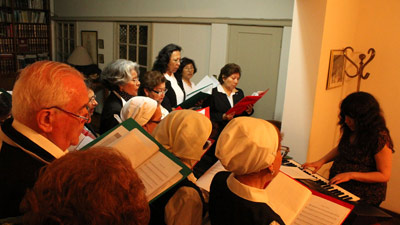basque heritage worldwide

12/11/2012

ADVERTISING
Lima, Peru. The Euskaletxea Basque club of Lima Peru gathered its members and friends to celebrate two occasions: the International Day of Euskera and the feast of San Francisco Javier. The event took place at the Euskal Etxea in the Miraflores district in Lima.
The day began with a talk by club president, Raul Noblecilla, who recalled that the first World Congress of Basque Collectivities, that took place in Gasteiz in 1995, decided to mark December 3 as the Day of Euskera. The event was proposed by Eusko Ikaskuntza in 1949 to coincide with the feast of San Francisco Javier, Jesuit missionary, who accompanied San Ignatius Loyola and since he too is Basque, then the day had a dual significance.
Noblecilla gave a short summary of the live of San Francisco Xabier, “from his birth on April 7, 1506 in a town near Pamplona, where the impressive Xabier Castle stands, an old military fortress that was converted into a Manor House, until his death near Macao on December 3, 1552,” he is remembered by Lima’s Basque club. He also recalled his encounter with Ignatius of Loyola, who founded the Jesuits in 1534 at the University of Paris: and his missionary journey through Portuguese India, Goa, in southern India, Ceylon, Malacca, the Malay Archipelago, Japan and China. He founded a Christian community in Japan after learning that language.
[Talk by club president Raul Noblecilla (photo LimaEE)]
Noblecilla also recalled another universal Basque, Pedro Arrupe that “four hundred years after his intensive missionary work in Japan, suffering the consequences, and in turn helping the victims of the atom bomb that destroyed Hiroshima.”
The club president then referred to Basque emphasizing that “scholars place its origins in the Paleolithic, and has no background or kinship with European languages.” He resisted talking about the invasions that went through the Iberian Peninsula, however, he did talk about the linguistic loans from Latin. He said, “For a long time it was restricted to the family community, in the villages. Considered a symbol of Basque identity, the language was repressed during the civil war and the Franco regime.”
[View of the room at the Basque club where the dinner took place (photo LimaEE)]
The event concluded with a performance by the Lima Basque club choir which performed several songs in Basque and ended with a dinner featuring Basque dishes.
ADVERTISING
ADVERTISING
ADVERTISING
ADVERTISING
ADVERTISING
© 2014 - 2019 Basque Heritage Elkartea
Bera Bera 73
20009 Donostia / San Sebastián
Tel: (+34) 943 316170
Email: info@euskalkultura.eus